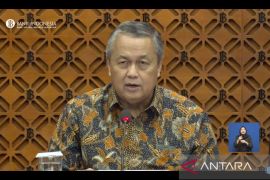The BI rate was maintained as the "dosage" of monetary relaxation made earlier is still enough to serve as an economic stimulus , an executive of the central bank said after the meeting.
"However, we still see room for further monetary relaxation in the months to come," Executive Director for Monetary and Economic Policy of the central bank Juda Agung said here on Thursday.
The interest on deposit (deposit facility) of banks in the central bank Bank is 4.5 percent and the interest charged by the central bank on liquidity credit (lending rate) for banks is 7 percent a year.
The "BI 7-Day Reverse Repo Rate", the new benchmark interest rate to replace BI rate to be effective on August 19 is also unchanged at 5.5 percent.
Juda said the central bank needs to stop further monetary relaxation after four times of aggressive steps cutting 100 basis points the BI rate from 7.5 percent in December, 2015 and relaxation of macro prudential policy.
The impact of the relaxation has not fully been channeled to the real and banking sectors, he said.
Whereas, many have seen change in the orientation of Bank Indonesia more toward driving economic growth and creating economic stability as the relaxation in monetary and macro prudential policy, he said.
"The monetary relaxation is still effective as a stimulus. Banks only need time for adjustment," he said.
He said with the monetary and macro prudential policy relaxation, the countrys economy is expected to grow 4.9 percent - 5 percent in the second quarter of 2016.
"I am convinced , it would be higher than the growth of 4.92 percent recorded in the first quarter of 2016," he said.
Communications Executive Director of the central bank, Tirta Segara said the members of the board of governors also agreed to set the term structure of monetary operation at 5.25 percent for 7 days, 5.45 percent for two weeks, 5.7 percent for 1 month, 6.1 percent for 3 months 6.3 percent for 6 months , 6.4 percent for 9 months and 6.5 percent for 12 months.
In general , macro economic stability has been under control as reflected by the inflation as predicted by the central bank at around 4 percent with current account deficit of 2-2.2 percent of the gross domestic product and rupiah stability.
"Transmission of monetary policy to bank interest rates also improved," he added. (*)
Editor: Heru Purwanto
Copyright © ANTARA 2016











